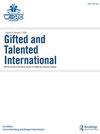Academic self-concept, achievement goals, and achievement: Is their relation the same for academic achievers and underachievers?
Q3 Social Sciences
引用次数: 17
Abstract
ABSTRACT This longitudinal study investigated the contribution of achievement goals and academic self-concept for the prediction of unexpected academic achievement (i.e., achievement that is higher or lower than expected with respect to students’ cognitive ability) in general and when comparing groups of extreme over- and underachievers. Our sample comprised 769 students (50.78% female, 160 underachievers, 176 overachievers) in the highest track of the German secondary school system who were assessed three times (in grade 5, 6, and 8). Controlling for students’ cognitive ability, results supported the reciprocal effects model for positive developmental relations between academic self-concept and achievement in the overall sample. Furthermore, academic self-concept and performance goals showed significant reciprocal relations. For achievement goals, only mastery goals showed positive reciprocal relationships with academic achievement, whereas performance goals (approach and avoidance) showed no significant relations. However, for underachieving students, academic self-concept as well as mastery goals were unrelated to later achievement, and for overachieving students, both constructs showed positive relations with later achievement. Findings indicate that interventions aimed at positive goal development might also produce positive and lasting impacts on academic self-concept and—mediated by self-concept—on academic achievement. However, this does not seem to apply to underachieving students.学业自我概念、成就目标和成就:学业优等生和差生之间的关系是否相同?
摘要:本纵向研究考察了成就目标和学业自我概念在预测意外学业成就(即在学生认知能力方面高于或低于预期的成就)方面的作用,并比较了极端优等生和差等生群体。我们的样本包括769名德国中学系统最高轨的学生(50.78%,女生,160名差生,176名优等生),他们被评估了三次(5年级,6年级和8年级)。控制学生的认知能力,结果支持整体样本中学业自我概念与成就之间积极发展关系的互惠效应模型。学业自我概念与学业成绩目标呈显著的相互关系。在成就目标方面,只有精通目标与学业成就呈正相关,而绩效目标(接近和回避)与学业成就无显著相关。然而,对于成绩差生,学业自我概念和掌握目标与后期成就无关,而对于成绩优异的学生,这两个构念与后期成就呈正相关。研究结果表明,以积极目标发展为目标的干预措施对学业自我概念产生积极而持久的影响,并通过自我概念对学业成绩产生中介作用。然而,这似乎并不适用于成绩不佳的学生。
本文章由计算机程序翻译,如有差异,请以英文原文为准。
求助全文
约1分钟内获得全文
求助全文

 求助内容:
求助内容: 应助结果提醒方式:
应助结果提醒方式:


